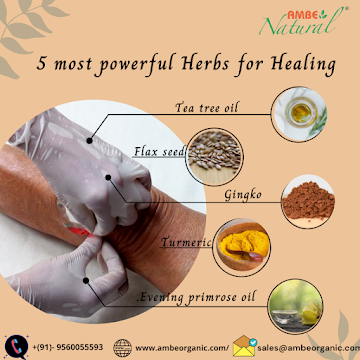5 most powerful Herbs for Healing
Today, we live in a time when manufactured Herb is prevalent, but should they be the only approach to healing
treatment?
Even with all these engineered options at our fingertips,
many people find themselves turning to the medicinal plants that started it
all: herbal remedies that help heal and promote physical and mental well-being.
Have the capacity.
However, many herbs and herbs teas offer harmless subtle
ways to improve your health. But always discuss with doctor before taking
herbs.
With this cautionary tale in mind, choosing the right plant
can seem daunting for someone who simply wants to feel better without taking
medication. So, with the help of expert Debra Rose Wilson, we're looking at the
most effective and therapeutic plants—the ones that have strong scientific
evidence to support their safe use.
Deciding about herbs with more traditional medicinal approaches is something you and your health care practitioner can address together. Sometimes, notes Wilson, ingesting the plants may pose even less risk than taking concentrated, manufactured supplements, because there is a greater risk of product contamination with manufacturing processes. It is a great way to experience their effects and the satisfaction of developing them yourself. Herbs can also be a way to add essential nutrients.
We hope this guide will serve as a starting point for those
who wish to integrate herbal remedies into their lives and arrive armed with
knowledge.
As one of the oldest tree species, gingko is also one of the
oldest homeopathic plants and a major herb in Chinese medicine. The leaves are
used to make capsules, tablets and extracts, and can be consumed as a tea when
dried. It is perhaps most famous for its ability to promote brain health.
Studies say that gingko may treat patients with mild to moderate dementia, and
may slow the decline of cognition in dementia and Alzheimer's disease. Recent
research is looking into an ingredient that may help with diabetes, and more
studies are ongoing, including an animal study that says it may affect bone
healing.
Turmeric, which originated in India, is believed to have
anti-cancer properties and can prevent DNA mutations. As an anti-inflammatory,
it can be taken as a supplement and is used topically for people with arthritis
who want to relieve discomfort. It is used around the world as a cooking
ingredient, making it a delicious, antioxidant-rich addition to many dishes.
According to recent research, turmeric is also promising as a treatment for a
variety of skin diseases and arthritis of the joints.
The evening primrose flower produces an oil that is thought
to ease PMS symptoms and skin conditions such as eczema. which have
anti-inflammatory properties. It is known to help conditions like atopic
dermatitis and diabetic neuropathy. It can also help with other health concerns
like breast pain. Recent research points to its use for improving quality of
life for patients with multiple sclerosis, altering hormone and insulin
sensitivity in people coping with polycystic ovary syndrome, and improving mild
dermatitis.
Flax seed, also available as an oil, is one of the safest
choices among plant-based dietary supplements. Harvested for thousands of
years, today flaxseed is praised for its antioxidant activity and
anti-inflammatory benefits.
Although more research needs to be done with human subjects,
one study suggested that flaxseeds may help prevent colon cancer.
Another study reported that flaxseed has the ability to
lower blood pressure. When consumed, it can also help in reducing obesity. Many
people add flaxseed and flaxseed meal to oatmeal and smoothies, and it is also
available in the form of tablets, oil (which can be put into capsules), and
flour.
The best way to add flaxseed is through your diet. Sprinkle
ground seeds on cereal or salads, add to hot cereals, stews, homemade breads or
smoothies. Add flaxseed oil to salad dressings.
Tea tree, which is native to Australia, produces an oil that
has long been considered beneficial for skin conditions, including mild acne,
athlete's foot, small wounds, dandruff, insect bites and other inflamed skin.
status is included.
Further study is needed into the use of acne and scalp, but
for now, there is a degree of research into the antimicrobial superpowers of
tea tree oil on wounds and topical infections.
A recent study noted that tea tree oil slowed the growth of
acne-causing microbes. It is commonly used as a highly concentrated essential
oil.
Wilson recommends that tea tree oil, as with all essential
oils, be diluted in a carrier oil. She says it's often already diluted in a
variety of skin care products and creams.
Ambe Ns
Agro Products Pvt Ltd has been certified ISO 9001:2008 for manufacturing,
testing, and supply of organic products and botanical extracts for
pharmaceutical, healthcare & nutraceutical industries. We offer a complete
range of high-quality Herbal extracts, Dry extracts, Phytochemicals,
Nutraceutical products, Organic powder, and Essential oils, Fragrances, and
Flavors at wholesale. And for more information visit: - http://www.ambeorganic.com/ Mail
on- sales@ambeorganic.com



.png)
Comments
Post a Comment